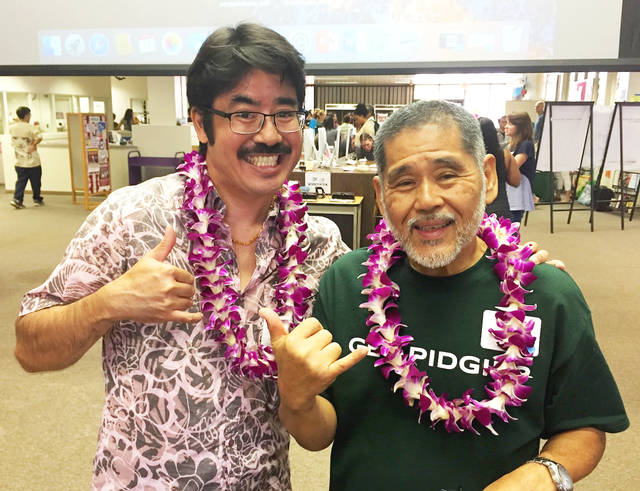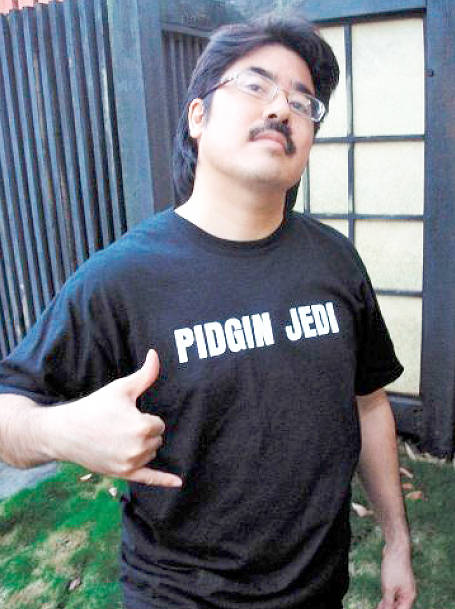Lee Tonouchi says he was born Pidgin, and on Oahu.
Pidgin is in his DNA, entwined in his every being, due to the fact that everybody in his family speaks “da Pidgin,” and Tonouchi writes it for a living.
“Das da kine Pidgin immersion li’dat,” Tonouchi says of his introduction into the world of Pidgin. He created his first book on the language in 2001 with his book “Da Word,” which was published by Bamboo Ridge. Several other publications soon followed that Tonouchi edited and wrote.
“I get one book of Pidgin essays called ‘Living Pidgin’ that came out in 2002 from Tinfish Press,” Tonouchi says of his literary feats. “I edited ‘Da Kine Dictionary: Da Hawai’i Community Pidgin Dictionary Projeck’ (Bess, 2005). I edited ‘Buss Laugh: Stand Up Poetry from Hawai’i’ (Bess, 2009). My Pidgin poetry collection, ‘Significant Moments in da Life of Oriental Faddah’ and Son’ came out from Bess Press in 2011. That one won da Association for Asian American Studies Book Award. An ’den I get one Pidgin children’s picture book coming out later this year, too, called ‘Okinawan Princess.’”
In 2015, after a five-year U.S. Census Bureau survey was conducted on 325,000 Hawaiian residents, Pidgin was added as an official language of Hawaii, joining over 100 census list recognized languages. Although English and Hawaiian are technically the co-official languages of the state, Pidgin stands as a third unofficial language that is used to talk story amongst kanaka maoli and other kama‘aina.
According to the New Pocket Hawaiian Dictionary, published by the University of Hawaii, “‘olelo pa‘i ‘ai” literally translates to “hard-taro speech” in English. According to Merriam-Webster’s dictionary, “Pidgin” means “A simplified speech used for communication between people with different languages.”
For Tonouchi, there’s one word in Pidgin he’s coined that’s leaving some people scratching their heads.
“Right now my favorite one is one that I coined — ‘nomonomoono,’ for when I write for frolichawaii.com,” Tonouchi said. “Das Hawaii’s bestest food blog. Lotta people no can figgah ‘em out. But it’s candy, brah. Jus’ gotta break up da word. No mo no mo ono. There is nothing more delicious.”
It’s not all fun and games for Tonouchi, who hopes that people learn from his books like “Livin Pidgin: Contemplations on Pidgin Culture.” He hopes his readers learn that Pidgin is one language, and that just like learning any other language, the more you know, “da more powah to you.”
“I guess comparing our Pidgin to world Pidgins, Creoles and dialects, da amazing ting about Hawaii Pidgin is how supa-fast it went from being one Pidgin to becoming one Creole, one full-blown language,” Tonouchi said of comparing Pidgin to any other language. “So though we call ‘em ‘Pidgin,’ it’s not really one Pidgin. Pidgin stay one Creole, and it became one full language in da time span of one generation back during da plantation era.”
The language was something that he was exposed to through living with his Kaimuki grandparents when he was small and then later in life when his Maui grandmother came to live with his family.
“So growing up I had lotta exposure to old-school Pidgin,” he said of the early Pidgin days. Nowadays for Tonouchi, he has turned that early exposure from his grandparents into a successful literary career that is supplemented by an active theatrical role that Pidgin is at the center of.
“Da last play I wrote wuz ‘UchinaAloha,’” Tonouchi says. “I even had one Pidgin play in LA at East West Players. That play, ‘Three Year Swim Club,’ wuz one Los Angeles Times Critics’ Choice Selection.”
With all the Pidgin that Tonouchi has studied and written, it all stems from a simple inspiration he got even after he was exposed to Pidgin as a child.
“I nevah even know had guys writing in Pidgin until I went UH and for one sophomore lit class da teacher wuz using one book called The Best of Bamboo Ridge,” Tonouchi said. “Inside dea had one poem called “Tutu on da Curb” by Eric Chock. Seeing that I wuz blown away, ‘cuz, I thought, ‘Wow, get guys writing in Pidgin,’ and we wuz studying ‘em in college. Ho, dat means you gotta be smart for study Pidgin! So seeing Pidgin models, da’s what inspired me for try write Pidgin, too.”
•••
Ryan Collins, county reporter, can be reached at 245-0424 or rcollins@thegardenisland.com.




Pidgin is the sound you make when you’re talking to a toddler or someone who’s seriously mentally challenged. Take the “F” word out of pidgin, and you’ve wiped out 3/4 of it.
On Tuesday, April 16 at 3:00, Lee will be reading his work in the cafeteria at Kauai Community College. This event is free and open to the public. All are welcome.
So is it an official or an unofficial language of Hawaii?
It’s an official language, but is not one of the two official languages of Hawaii. Hope that makes sense?
I, too, am a product of a “pidgin English” environment, delighted with the privilege of being raised in a multi-cultural, plantation-town community—-Kekaha, Kauai! It’s a “down-to-earth”, gut-level way of expressing what you think and feel in a manner and style that is suitable to the occasion! Mo bettah, lah dat!
Let me know how I may acquire your books. I would like to share with my grandchildren and great grandchildren. I was born in Hilo, Hawaii, now live in Connecticut and still have family in Hilo. My children were all born on Oahu and now live in various states. I would like them to learn how I grew up talking Pidgin. Mahalo Nui Loa